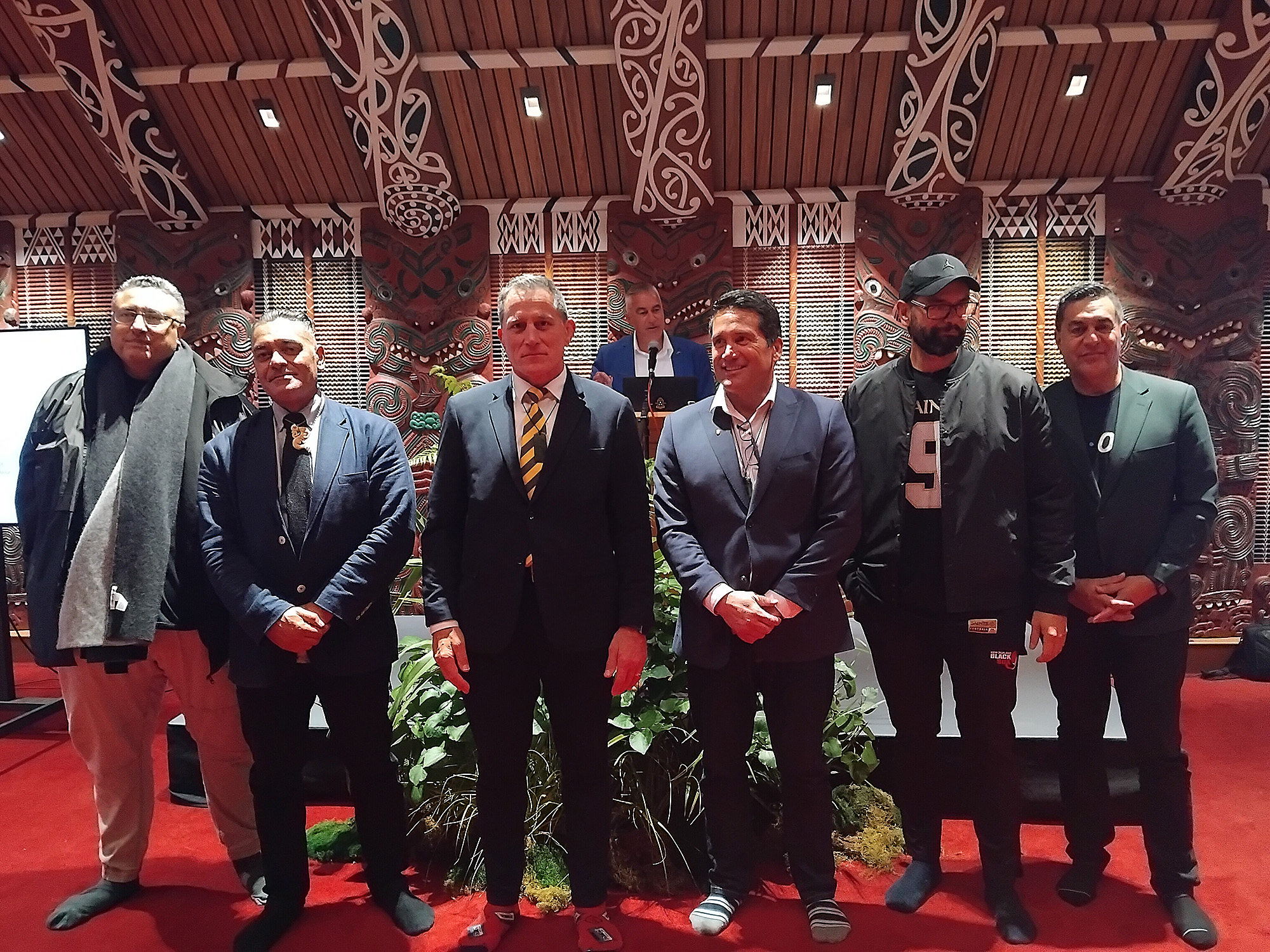Māori men's wellbring focus at symposium

SHARING STORIES: A Tāne Ora symposium drew several speakers, including Riki Nia Nia, left, Professor Meihana Durie, Dallas Seymour, Lance O’Sullivan, Luke Rowe and emcee Julian Wilcox, with Professor Te Tani Kingi in the background. Photo Kathy Forsyth E5450-01
Kathy Forsyth
Personal stories and cultural insight shaped a humour-filled symposium that placed Māori tāne (men) and their wellbeing at the heart of discussion this week.
Tū Tāne Māori: Tāne Māori Perspectives of Tāne Ora, hosted by Te Whare Wānanga o Awanuiārangi’s mental health and wellbeing research programme Te Aratiatia ki te Hauora, in partnership with Te Moana a Toi and Te Aka Whai Ora, brought together a line-up of leading thinkers, health experts and cultural leaders. The event was emceed by the engaging Julian Wilcox.
“This is probably the most important hui we will have this year,” said Riki Nia Nia, chief executive of Te Rau Ora and Chair of Tāne Ora.
“Without tāne ora, we can’t have whānau ora. And without whānau ora, we can’t have hapū or iwi ora. Tāne ora, alongside wāhine and other forms of ora, is critical to achieving the aspirations of our whānau.”
Mr Nia Nia urged tāne to invest time and energy into their own wellbeing, candidly sharing his personal health journey.
“At the end of March, I jumped on the scales – I was in the 200-kilogram whānau,” he said. “I spent time in Turkey recently, resetting my hauora. Because when you’re 200kg, there are some things you can do, but there are a lot of things you can’t do.”
He reinforced that wellbeing starts with the self: “If we don’t look after ourselves, it’s very hard to look after others.”
He also spoke about the importance of global awareness, including how overseas decisions impact local issues such as food sovereignty.
Dr Luke Rowe, clinical psychologist and tāne ora researcher, shared lessons drawn from two decades of work across health, whānau ora, and elite sport. His PhD research centred on the Hurricanes Super Rugby team, explored what motivates Māori men and supports their wellbeing.
“These were the guys who shared their time and their voices and experiences around this concept called high performance.”
He distinguished tāne ora from mainstream men's health: “Men’s health and Māori men’s health often focus on conditions, disorders and diagnoses. Tāne ora is grounded in te ao Māori.
While some solutions might overlap, the approaches were fundamentally different, he said.
Themes that emerged in his research included the power of relationships, navigating between professional and personal identities, and the importance of collective strength: “To develop a high-performance mindset, these tāne needed to be around their brothers, and I don’t necessarily mean this in the literal sense.”
Former All Black, Māori All Black, and Commonwealth Games rugby sevens gold medallist Dallas Seymour also shared his journey – highlighting the role of whānau, sport, and discipline in shaping his life.
He reflected on the deep influence of family and cultural roots alongside the lessons he learned from high-performance sport.
Mr Seymour’s kōrero bridged the world of elite sport and personal growth.
New Zealander of the Year in 2014 and general practitioner Dr Lance O’Sullivan, who has been passionate about improving Māori health outcomes, shared his personal journey.
Dr O’Sullivan said he had more to share the medical aspects of men’s wellbeing.
"I think something really important I could share is that health is more than medicines, prescriptions and scans and diagnoses and prognoses.”
Dr Lance O’Sullivan spoke vulnerably about his own path, emphasising the value of failure.
Ten years ago, he was at the height of success, New Zealander of the Year, a respected doctor who had overcome a tough childhood, happily married with children and an in-demand public speaker.
"After the heights of success, came another stage of my life ... five years ago, marriage breakup, challenges in my business and to my profession.”
Dr O’Sullivan revealed that his son’s diagnosis of a life-shortening condition triggered intense emotional challenges, leading to his own diagnoses of depression and anxiety.
“Mental health is critical; how can you have good relationships if you don’t have good mental health.
“My greatest achievement in life is all the failures I can talk about, it is not the times I have succeeded, it is the failures I have encountered and overcome.
“I am on this climb back up. It is hard and it is a challenge, but I don’t want to go through life thinking everything is easy. The idea that you learn from your mistakes is critical.”
Professor Meihana Durie, recently appointed chief executive of Te Wānanga o Raukawa, offered insights into how culture underpins health, wellbeing, and tāne ora.
Using the story of Māui as a metaphor, he said: “This is a commentary about how we as Māori view our roles in society, but it is also a message to say you can overcome the perceptions or misperceptions that people have of you.”
He critiqued Western models of education, particularly the rigid use of time.
“We should determine time. We shouldn’t allow time to dominate and prescribe how we live our lives. I still believe the imposition of a Western model of education has not done us any favours.”
Prof Durie also revisited Te Whare Tapa Whā, the holistic Māori health model he developed, which frames wellbeing as a balance of four interconnected pillars: taha wairua (spiritual), taha hinengaro (mental), taha tinana (physical), and taha whānau (family).
He warned of the risks when ambition stalls. When Māori men lose their drive and purpose - whether through school, work, or life – it can lead to unwellness and prevent Māori men achieving their full potential.